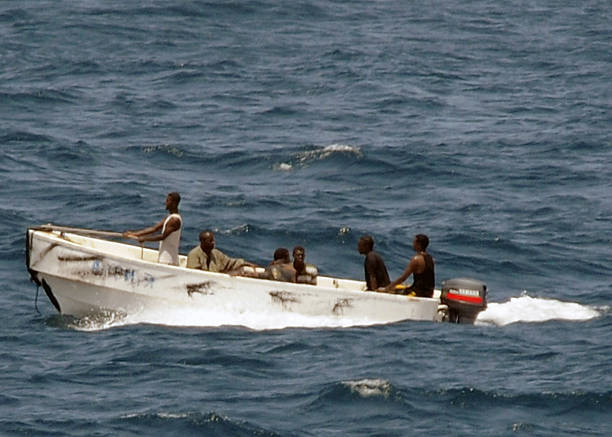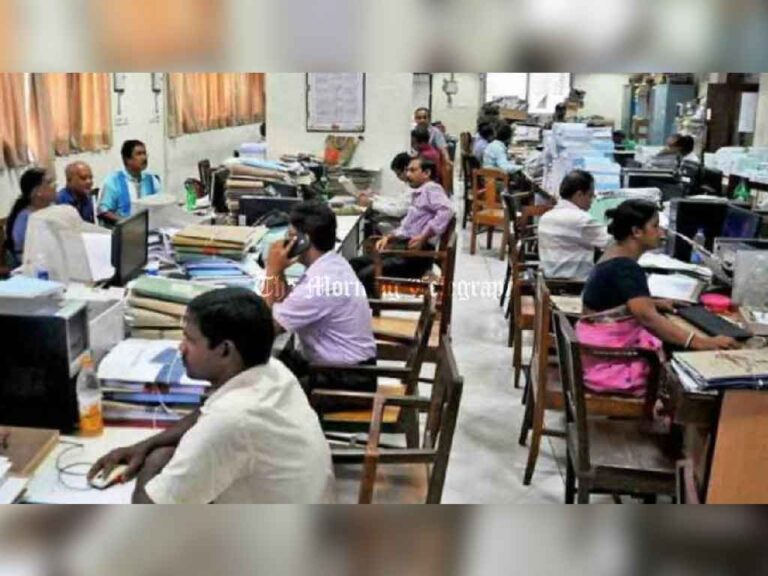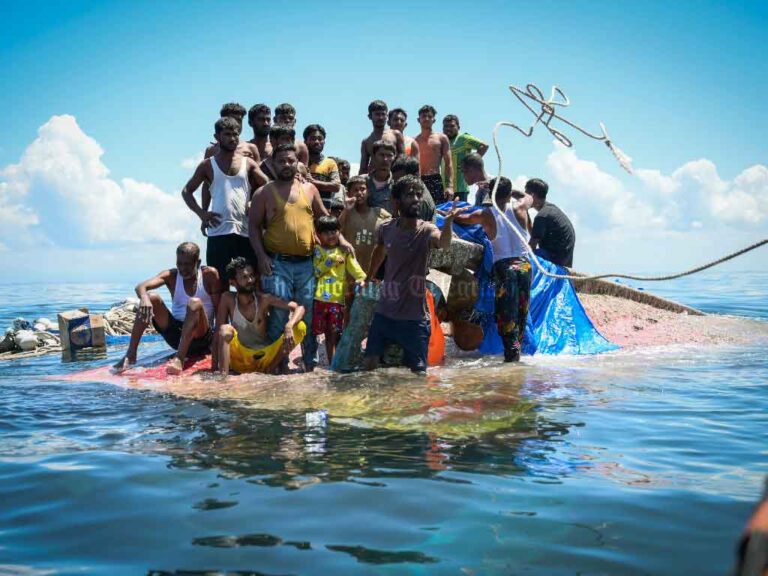
INDIAN OCEAN - OCTOBER 8: In this handout photograph provided by the U.S. Navy, pirates leave the merchant vessel MV Faina for the Somalia shore under observation by a U.S. Navy ship October 8, 2008 at sea in the Indian Ocean. The Belize-flagged cargo ship is owned and operated by Kaalbye Shipping, Ukraine and is carrying a cargo of Ukrainian T-72 tanks and related military equipment. The ship was seized by pirates September 25 and forced to anchor off the Somali coast. (Photo by Jason R. Zalasky/U.S. Navy via Getty Images)
Hijackers return as turbulence rocks Red Sea
Sri Lankan fishermen sailing the deep seas close to the Arabian and African Coasts have become increasingly jittery following the recent abduction of a fishing vessel by the dreaded Somali pirates that have shown a strong comeback and are prepared to harass merchant shipping vessels as a coalition of international warships are engaged in battle with a threat from Yemen’s Houthi rebels that have carried out several attacks disturbing the strategic maritime traffic to the Red Sea.
The Somali pirates who were silent for the past two years seems to have grabbed the opportunity to operate in their favourite waters as the world’s naval forces concentrate on battling the Iranian backed Houthi rebels who have vowed to attack vessels on the Red Sea in retaliation for Israel’s bloody war in the Gaza.
The Houthis are demanding an unconditional end to the Israel attacks on the Gaza Strip and they have eve reached out to the international community towards this end but neither Israel or even international agencies Arabs or otherwise are not in a mood to listen.
Away from the Houthis and the international navy a small Sri Lankan fishing trawler with six crew was grabbed by Somali pirates on Saturday last week but were subsequently freed by the Seychelles Coast Guard and Air Force.
Three of the pirates are currently in custody of the Seychelles’ authorities while the six-member crew will set sail for the Sri Lankan Coast at the very earliest once the necessary paperwork is completed, said Niluka Kadurugamuwa the Chief Communication for the Foreign Office in Colombo.
“The six Sri Lankan fishermen were well received by the authorities in that country and their welfare is being looked into by Sri Lanka’s Ambassador to the Seychelles”.
“The fishermen are in good health and are eagerly waiting to get back home at the very earliest”, Kadurugamuwa said.
The deep-sea fishermen for their part are jittery to get back into the international waters after the recent abduction, but they are left with little option since it is their livelihood.
“It is a scary job these days but if we fail to continue with our work the boats will end up in the scrap yard”, says the President of Sri Lanka’s All-Island Multi-Day Boat Owner’s Association (SLAIMDBOA) Tyrone Priyantha Mendis.
He added that they would be safe in the deep seas if there is a Sri Lankan naval presence in the area on a 24/7 basis, but at the same time adds that it is a tall order when compared with the logistical capacity of the Sri Lankan navy.
The fishermen are not alone in the deep seas simply because there is the ever presence of the Combine Maritime Forces (CMF) made up of 41 countries including Sri Lanka.
The CMF is present to combat non-State actors in the region and this includes the so-called Somali sea pirates.
Over the years the CMF has made scores of arrests of Somali pirates and rescued hundreds of Seafarers, fishermen or otherwise.
This is a large waterway and always there would be an occasional case as what happened to the Sri Lankan fishing trawler last week.
The activities of the Somali pirates practically seized two years ago largely owing to the presence of the CMF coalition in the area and now they have re-surfaced owing to the ongoing turbulence in the Red Sea and elsewhere.
However the CMF is well aware of this development and will take necessary action to stop the menace”, Navy Spokesman Captain Gihan Wickramasooriya said.
Apart from the CMF presence large merchant vessels have also hired heavily armed mercenaries to sail on board and they usually have a zero tolerance for sea pirates Somali or otherwise, another senior naval official said.
The director for operations at the Seychelles Coast Guard, Major Hans Radegonde, told reporters that they received reports that piracy had started again in the region since late last year.
“Now we are noticing that piracy is becoming more frequent than last year and the area where they are operating is closer to Seychelles waters. Our operation remains the same as it was. We’ve always been on alert; we’ve never let our guard down,” he said.
Radegonde clarified that they received word about the incident from the Sri Lankan Navy on Saturday and the operation to free the hostages took place on Monday after the vessel entered the Seychelles Exclusive Economic Zone, which is 1.4 million square kilometres.
“We got word on Saturday afternoon and we already had planes and boats patrolling that area at the time, so immediately we went to the location where the boat was supposedly highjacked. This was outside our EEZ at around 400 to 500 thousand nautical miles northeast of Mahe. It took us about one day and a half to track the boat and observe the route it was taking. At that point, we saw that they entered the Seychelles’ EEZ at about 180 thousand nautical miles away from Denis Island,” he explained.
Radegonde said, “After a preliminary inspection, we observed that the people on board the boat were armed, and the closer we got, we were able to confirm that they were Somali pirates. They resisted for about five to six minutes and would not stop their boat. They even fired shots at the Coast Guard. But this was quickly put under control. This was a delicate operation, especially with hostages involved, thankfully we did not have any casualties.”
The Sri Lankan vessel, ‘Lorenzo Putha-04,’ is berthed at the Seychelles Coast Guard Base while the three Somali suspects were handed into police custody upon arrival.
INDIAN NAVY RESCUES PAKISTAN, IRANIAN SAILORS
Indian naval forces had rescued 19 Pakistani sailors on January 26 after their fishing vessel was hijacked by pirates off Somalia’s coast.
This was the second rescue operation in 36 hours by Indian warship INS Sumitra.
Hours earlier, the ship had rescued the 17-member Iranian crew of a vessel which was also hijacked by pirates, the navy said.
India’s navy has responded to several distress calls from vessels and sailors over the past few weeks.
Recent attacks on vessels off Somalia’s coast have triggered concerns that pirates could be becoming active again in the region.
INS Sumitra has been deployed for maritime security operations along the east coast of Somalia and Gulf of Aden.
A navy statement said that the ship had responded to a distress message on January 28 and intercepted an Iranian-flagged vessel. Naval officers then “coerced the pirates for safe release of crew along with the boat”.
Once the 17 crew members were released, the ship was sanitized and allowed to continue on its journey. The statement did not mention the status of the pirates.
On Tuesday, the navy said INS Sumitra was again “pressed into action to locate and intercept another Iranian-flagged fishing vessel Al Naeemi”.
Navy personnel boarded the vessel to sanitise the vessel and check on the well-being of the crew, it added.
The status of the pirates was not mentioned again, but a photo posted on X showed armed Navy personnel guarding men who had their hands tied behind their backs.
According to a Bloomberg report, the increase in piracy off Somalia’s coast is linked to the disruption in maritime security due to a series of attacks on ships in the Red Sea by the Houthis, an Iran-backed rebel group.
On January 26, the Indian Navy said it deployed its warship INS Visakhapatnam in the Gulf of Aden in response to a distress call from Marlin Luanda, a tanker with links to the UK that was on fire for several hours after being hit by a missile fired by the Houthis. French and US naval ships also provided assistance to the vessel.
And earlier in January, Indian navy commandos had rescued 21 crew members from a Liberian-flagged ship which was attacked by pirates off the Somalian coast.
The National Union of Seafarers Sri Lanka (NUSS) this week repeated its advice to all Sri Lankan Seafarers and fish workers to be extra cautious while operating in the Arabian and adjoin seas owing to the increase in activity of Somali Pirates and the ensuing fighting between Houthi rebels and international navies.
“Both Seafarers and fish workers need to work for a living pirates, war otherwise but at the same time one has to b cautious while sailing in that volatile region.
The NUSS is not discouraging persons against taking up employment in the those areas but alertness and precautions should remain the key factor at all times” Palitha Atukorale, President of the NUSS said.
He was reacting to the recent abduction of six Sri Lankan crew members along with their multi-day fishing vessel in the Gulf of Aden.
The crew and their boat was subsequently freed by the security forces from the Seychelles and are due to return to the country at the very earliest.
The NUSS is a Sri Lankan maritime union that packs a member ship of some 15,000 Sri Lankan Seafarers.




